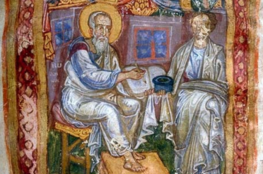If one peruses world Orthodoxy news from the last few months, one is likely left with the impression that the forthcoming 2016 Pan-Orthodox Council will either not happen or be rendered meaningless by a lack of global participation if it does. The Council, which some observers see as a power play by the Ecumenical Patriarch (EP), has received — at best — tepid enthusiasm from the Moscow Patriarch (MP), the largest patriarchate in the Orthodox Church today. It is well known that the EP and MP have been at each other’s throats in recent years over the question of primacy, with the comparatively weaker EP asserting by right with the MP quietly, but noticeably, holding to primacy in fact. Given Moscow’s expansive vision of its power and influence as embodied in its “Russian World” ideology, it is extremely doubtful that it would acquiesce to any proceedings which risk compromising its unique — and some might say “central” — position in Eastern Orthodoxy today.
Beyond the high-level political squabbling, there are other compelling reasons why this Council should not take place. First, if the experience of the Roman Catholic Church means anything to the Orthodox (and it probably does, even if they don’t like to admit it), then they should know the risks of holding a a sweeping council at this juncture in history, especially one which seems directed toward “openness” and “adjusting” with the times. Second, it doesn’t appear that the Orthodox Church is prepared to settle major internal disputes such as the status of certain “breakaway” churches like the Kyivan Patriarchate (KP) in Ukraine. Given the millions of MP members who have switched over to the KP in recent years, this is no minor matter. And last, unlike many earlier councils (ecumenical or otherwise), it does not appear that the 2016 Council is directed toward confronting concrete heresies or major disciplinary matters. While world Orthodoxy arguably needs to sort out any number of serious doctrinal issues, ranging from primacy to contraception, that’s not going to happen this year anyways and, indeed, may not happen for decades (if ever).




January 2, 2016
Do you have any links handy that illustrate the MP’s stated attitude toward the supposed upcoming Council?
January 2, 2016
I was wondering whether there had been an official statement or not.
January 2, 2016
A sample…
http://risu.org.ua/en/index/all_news/orthodox/moscow_patriarchy/55708/
http://risu.org.ua/en/index/all_news/confessional/orthodox_relations/60822/
http://risu.org.ua/en/index/all_news/orthodox/orthodox_world/62079/
January 2, 2016
Without an Emperor to make them convene a council, there will never be another pan-Orthodox council as they are too divided.
January 2, 2016
There have been several pan-Orthodox councils held without an emperor, even if they aren’t officially called “ecumenical councils”.
Assuming this council actually happens, there’s no risk of it becoming an Orthodox Vatican II, because the decision making process relies on consensus. Even if someone were to put forward, say, a revision of the liturgy or a curtailing of fasting, all it would take is for one local church to say no and the motion would fail.
The main problem is whether such a council would accomplish anything substantive. If it did go forward, I would be surprised if it accomplished anything more than a rubber-stamping of some pre-approved feel-good committee-drafted statements which change nothing and resolve nothing.
January 4, 2016
actually liturgical revision as well as fasting do happen, but on the local level. Matins in a Greek church, as an example, are quite different than one finds in a Russian one.
Personally, I see no real need for such a council, it will instead of helping the situation, most likely simply amplify the ethnic fault lines.
January 4, 2016
Yes but that’s quite different from the uniformity imposed by Vatican II (or Trent for that matter). There will be no Orthodox Novus Ordo. The council is unlikely to change anything because any decision requires consensus and there is no consensus on any of the big issues on the agenda.
January 6, 2016
Trent did not establish liturgical uniformity, I have no idea where that idea began, any liturgical tradition with a two-hundred or more year standing was not superseded by the minor changes made between the 1474 Missal and that of 1570 (two words in the ordinary of the Mass).
On the other hand, the suppression of the old rite in 1666 Russia is an example of complete and total demand for liturgical uniformity. Causing not only schism, but the burning of many who would not submit to the liturgical changes of the new rite.
There are photos of the Byzantine rite, in Greece, being celebrated in front of the ikononstasis and facing the people: http://www.byzcath.org/forums/ubbthreads.php/topics/407570/From_Greek_Orthodoxy:_Priest_F
January 7, 2016
Trent suppressed a lot of local or even widespread practices considered “abuses”, such as the troped kyries. It did impose a liturgical uniformity- the fact is the Latin rite was considerably less diverse afterwards. The Nikonian reforms were the actions of a local church. Regarding that versus populum Byzantine rite, you’re really grasping at straws. It is a single instance of someone supposedly reviving some defunct rite and does not constitute a churchwide reform. What’s your point in all this? Are you seriously trying to argue that an Orthodox novus ordo is on its way? Get a grip.
January 7, 2016
The troped Kyries are very late, did you not bother to read what I wrote? Any tradition with a two hundred or longer tradition was to continue, and was. How many various traditions exit in the Byzantine Orthodox church? The west still has the Dominican, a tradition preserved because it reached the two hundred year mark, the Ambrosian and the rite of Lyon, which still preserved concelebration in the Latin tradition.
The novus ordo has already arrived, at least in the ROCOR western rite, here is one of their approved liturgies, you may notice that the offertory prayers are completely novus ordo as is most everything else. Simply having more incense does not make it not novus ordo: http://www.rwrv.org/files/SaintGregorytheGreat.pdf
Also, the original intent of the novus ordo was also to revive “some defunct rite.”
Did you bother to read some of the messages attached to the ad populum Orthodox liturgy? It was not some one time thing, it has also been prodcast on national Greek television.
Get a grip.
January 14, 2016
You seen overly optimistic I’m afraid. The Second Vatican Council was also conducted by consensus and the documents left a little vague and I substantive. It is precisely these two things which allowed the innovators to justify their post-conciliar shenanigans: the documents were vague enough for them to be used to justify all sorts of changes not foreseen by the Council Fathers and the consensus vote meant that the innovators could portray all their opponents as reactionary extremists opposed to the clear will of the whole Church.
January 6, 2016
Fr. John Behr once quipped that we are unlikely to have another Ecumenical Council with Orthodox and Catholics because we no longer have Popes who would not want to attend them. 🙂
January 2, 2016
[…] Sanchez, whose sense of the Orthodox world is much keener than ours, has a brief, interesting comment about the planned Pan-Orthodox Council. In short, Sanchez says that there are now doubts that it will happen at all, or, if it does, it […]
January 2, 2016
For things Russian I always check pravoslavie first. Here is their latest on the council. http://www.pravoslavie.ru/english/89239.htm
January 5, 2016
Vat, no Counzil??? Is outrage!!! How can ve rule withzout total submission?????